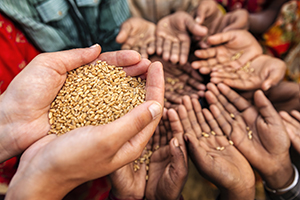Will the Poor Always Be With Us? (Part 3) By Babatunde Olugboji
This week, we’ll conclude our examination of Jesus’ seminal statement, “The poor will always be with you” in Matthew 26:11. When Jesus said this, did He mean that we should tolerate poverty because it is what it is?

No. First, Jesus was making a point about worship. The only reason Jesus brought the poor into the conversation was in response to the self-righteous misreading of the devotion of a woman we are never to forget. Second, by referring to a passage from Deuteronomy, Jesus was reminding the disciples that the only reason there are poor in God’s abundant creation is because of sin and self-centeredness.
The disciples did not care about the poor as much as they did about trying to make points at the expense of the woman. “The poor you will always have with you,” was a rebuke to Jesus’ disciples. The passage in Deuteronomy that Jesus referenced closes with a command. After the verse, “There will always be poor people in the land,” we find this: “Therefore I command you to be openhanded toward your brothers and toward the poor and needy in your land.” (Deuteronomy 15:11)
God’s world is productive enough to meet the needs of all. Human beings created in the image of God are creative and productive enough to make it so. Yet the sin in the human heart and the curse of a fallen creation means that God’s world will not be what it was created to be.
Although God never intended that there be any poor, He also knew that there would always be poor people as long as there are sinful people in the world. Jesus’ statement about the poor always being with us is intended to shame us, to remind us that this is a true statement only because we have failed. Jesus never intended to justify tolerance for the presence of poor people in the land.
What can we conclude from all this?
First, Jesus was not excusing the presence of poor people among us. He knew that His Father provides more than enough through His creation. Jesus was reminding us, with some considerable irony, that the poor are here because we have failed to keep God’s commands.
Second, the real lesson from Deuteronomy is that unrighteousness, of those who are not poor and of the poor themselves, is the cause of poverty. At the most fundamental level, sin distorts our relationship with God, with each other and with our world. Our relationships do not work for our well-being, and the result is poverty, racism and other expressions of injustice. Poverty was and is not part of God’s intention.
Third, to tolerate poverty by excusing it in Jesus’ name is an insult to our Lord who so consistently extended his affection and touch to those who were poor, sick and suffering. It makes a mockery of Jesus’ statement of His mission in Luke 4:18 that He has been “anointed to preach the gospel to the poor; to heal the brokenhearted, to proclaim liberty to the captives and recovery of sight to the blind; to set at liberty those who are oppressed.”
Finally, our response to the poor is to be open handed. We are to share what God has given us. “Give generously to him (the poor) and do so without a grudging heart.” (Deuteronomy 15:10) The result of this attitude of sharing is that the Lord will bless you in all your work and in everything you put your hand to. Caring for the poor is good for us.
Have a great week.
Join me live on FACEBOOK & YOUTUBE every Sunday at 7am (EST) for an insightful time of the word.
+1-732-554-1376 (WhatsApp)
@KingdomChat https://www.facebook.com/KingdomEdifice


